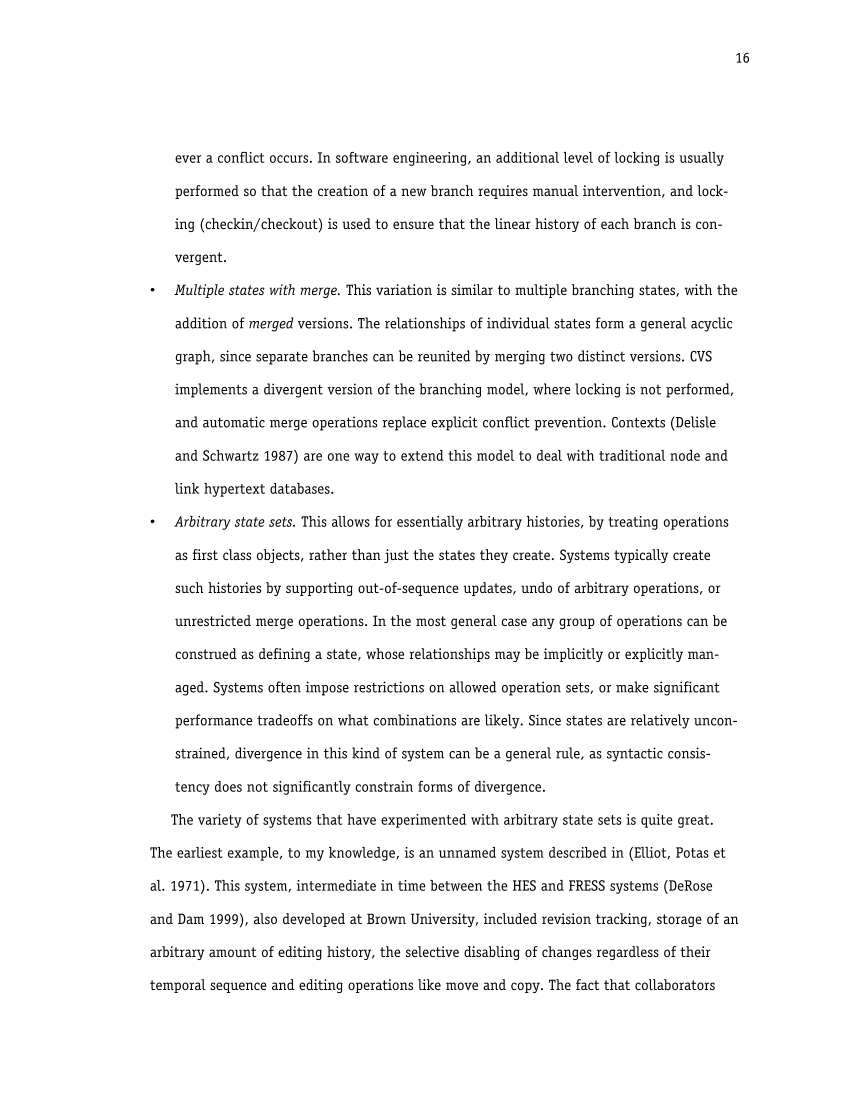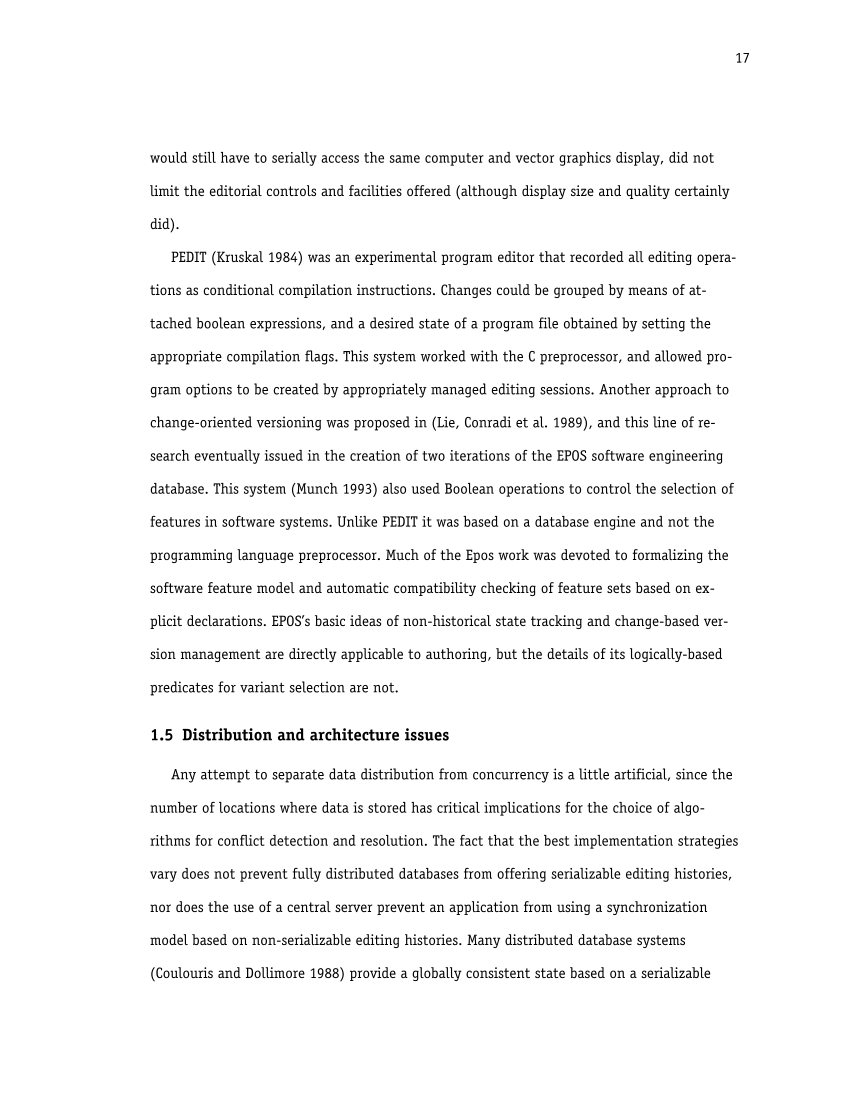16
ever�a�conflict�occurs.�In�software�engineering,�an�additional�level�of�locking�is�usually
performed�so�that�the�creation�of�a�new�branch�requires�manual�intervention,�and�lock-
ing�(checkin/checkout)�is�used�to�ensure�that�the�linear�history�of�each�branch�is�con-
vergent.
• Multiple�states�with�merge.This�variation�is�similar�to�multiple�branching�states,�with�the
addition�of�mergedversions.�The�relationships�of�individual�states�form�a�general�acyclic
graph,�since�separate�branches�can�be�reunited�by�merging�two�distinct�versions.�CVS
implements�a�divergent�version�of�the�branching�model,�where�locking�is�not�performed,
and�automatic�merge�operations�replace�explicit�conflict�prevention.�Contexts(Delisle
and�Schwartz�1987)are�one�way�to�extend�this�model�to�deal�with�traditional�node�and
link�hypertext�databases.
• Arbitrary�state�sets.This�allows�for�essentially�arbitrary�histories,�by�treating�operations
as�first�class�objects,�rather�than�just�the�states�they�create.�Systems�typically�create
such�histories�by�supporting�out-of-sequence�updates,�undo�of�arbitrary�operations,�or
unrestricted�merge�operations.�In�the�most�general�case�any�group�of�operations�can�be
construed�as�defining�a�state,�whose�relationships�may�be�implicitly�or�explicitly�man-
aged.�Systems�often�impose�restrictions�on�allowed�operation�sets,�or�make�significant
performance�tradeoffs�on�what�combinations�are�likely.�Since�states�are�relatively�uncon-
strained,�divergence�in�this�kind�of�system�can�be�a�general�rule,�as�syntactic�consis-
tency�does�not�significantly�constrain�forms�of�divergence.
The�variety�of�systems�that�have�experimented�with�arbitrary�state�sets�is�quite�great.
The�earliest�example,�to�my�knowledge,�is�an�unnamed�system�described�in�(Elliot,�Potas�et
al.�1971).�This�system,�intermediate�in�time�between�the�HES�and�FRESS�systems(DeRose
and�Dam�1999),�also�developed�at�Brown�University,�included�revision�tracking,�storage�of�an
arbitrary�amount�of�editing�history,�the�selective�disabling�of�changes�regardless�of�their
temporal�sequence�and�editing�operations�like�move�and�copy.�The�fact�that�collaborators
ever�a�conflict�occurs.�In�software�engineering,�an�additional�level�of�locking�is�usually
performed�so�that�the�creation�of�a�new�branch�requires�manual�intervention,�and�lock-
ing�(checkin/checkout)�is�used�to�ensure�that�the�linear�history�of�each�branch�is�con-
vergent.
• Multiple�states�with�merge.This�variation�is�similar�to�multiple�branching�states,�with�the
addition�of�mergedversions.�The�relationships�of�individual�states�form�a�general�acyclic
graph,�since�separate�branches�can�be�reunited�by�merging�two�distinct�versions.�CVS
implements�a�divergent�version�of�the�branching�model,�where�locking�is�not�performed,
and�automatic�merge�operations�replace�explicit�conflict�prevention.�Contexts(Delisle
and�Schwartz�1987)are�one�way�to�extend�this�model�to�deal�with�traditional�node�and
link�hypertext�databases.
• Arbitrary�state�sets.This�allows�for�essentially�arbitrary�histories,�by�treating�operations
as�first�class�objects,�rather�than�just�the�states�they�create.�Systems�typically�create
such�histories�by�supporting�out-of-sequence�updates,�undo�of�arbitrary�operations,�or
unrestricted�merge�operations.�In�the�most�general�case�any�group�of�operations�can�be
construed�as�defining�a�state,�whose�relationships�may�be�implicitly�or�explicitly�man-
aged.�Systems�often�impose�restrictions�on�allowed�operation�sets,�or�make�significant
performance�tradeoffs�on�what�combinations�are�likely.�Since�states�are�relatively�uncon-
strained,�divergence�in�this�kind�of�system�can�be�a�general�rule,�as�syntactic�consis-
tency�does�not�significantly�constrain�forms�of�divergence.
The�variety�of�systems�that�have�experimented�with�arbitrary�state�sets�is�quite�great.
The�earliest�example,�to�my�knowledge,�is�an�unnamed�system�described�in�(Elliot,�Potas�et
al.�1971).�This�system,�intermediate�in�time�between�the�HES�and�FRESS�systems(DeRose
and�Dam�1999),�also�developed�at�Brown�University,�included�revision�tracking,�storage�of�an
arbitrary�amount�of�editing�history,�the�selective�disabling�of�changes�regardless�of�their
temporal�sequence�and�editing�operations�like�move�and�copy.�The�fact�that�collaborators





























































































































































































